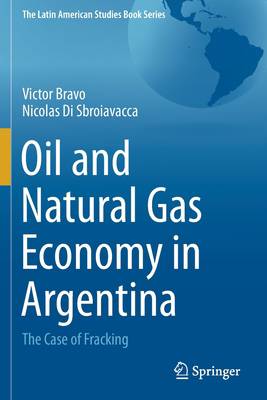
En raison d'une grêve chez bpost, votre commande pourrait être retardée. Vous avez besoin d’un livre rapidement ? Nos magasins vous accueillent à bras ouverts !
- Retrait gratuit dans votre magasin Club
- 7.000.000 titres dans notre catalogue
- Payer en toute sécurité
- Toujours un magasin près de chez vous
En raison de la grêve chez bpost, votre commande pourrait être retardée. Vous avez besoin d’un livre rapidement ? Nos magasins vous accueillent à bras ouverts !
- Retrait gratuit dans votre magasin Club
- 7.000.0000 titres dans notre catalogue
- Payer en toute sécurité
- Toujours un magasin près de chez vous
147,95 €
+ 295 points
Format
Description
This book gathers four papers authored by Víctor Bravo and Nicolás Di Sbroiavacca, Oil and Natural Gas Engineers, specialized in Energy Economics. The main axis of the book is the application of the exploitation techniques of Oil and Natural Gas in Argentina, by the so-called "conventional" methods, in comparison with the so-called "Fracking", (name massively used in the First World and particularly in the United States of America). Argentina has important Oil and Natural Gas resources in different regions of its wide geography. To develop these "non-conventional" techniques has generated endless controversies all over the world, mostly due to its estimated environmental impact and the need of significant requirement of large capitals for investment.
Argentina is not out of this relevant controversy because in the mind of the maximum national authorities, fracking is one of the main factors that may contribute to generate monetary funds devoted to the payment of the immense foreign debt of this country. Other authors estimate that it is not possible to develop our country just on the basis of the massive exploitation and boundless export of natural resources. Consequently, fracking is undoubtedly a topic of National Energy Politics.
In this scenario, a previous analysis of the National Energy Politics of the recent governments of Argentina, after the bloody military dictatorship of 1976-1983 and the return to democratic governments in December 1983. This analysis is done over the chapters "Analysis of the National Law N° 27007 (known as the "Hydrocarbon Resources Law") and the Oil and Natural Gas politics", the "Oil and Natural Gas Politics of the period from 2003 to 2014" and "The Argentine Energy Politics during the 2014-2018 period". Later on, the "Fracking" case is fully developed with two complementary analyses. One of them is basically centered on the technical and prospective scenarios for "fracking" "Shale Oil and Shale Gas in Argentina: Situation and Perspectives". The other one, "A technical opinion about Fracking", contemplates the impacts resulting from the use of these techniques, especially those concerning the environment. Anyhow, each of the chapters are self-contained, thus permitting separate reading of any of them.
Argentina is not out of this relevant controversy because in the mind of the maximum national authorities, fracking is one of the main factors that may contribute to generate monetary funds devoted to the payment of the immense foreign debt of this country. Other authors estimate that it is not possible to develop our country just on the basis of the massive exploitation and boundless export of natural resources. Consequently, fracking is undoubtedly a topic of National Energy Politics.
In this scenario, a previous analysis of the National Energy Politics of the recent governments of Argentina, after the bloody military dictatorship of 1976-1983 and the return to democratic governments in December 1983. This analysis is done over the chapters "Analysis of the National Law N° 27007 (known as the "Hydrocarbon Resources Law") and the Oil and Natural Gas politics", the "Oil and Natural Gas Politics of the period from 2003 to 2014" and "The Argentine Energy Politics during the 2014-2018 period". Later on, the "Fracking" case is fully developed with two complementary analyses. One of them is basically centered on the technical and prospective scenarios for "fracking" "Shale Oil and Shale Gas in Argentina: Situation and Perspectives". The other one, "A technical opinion about Fracking", contemplates the impacts resulting from the use of these techniques, especially those concerning the environment. Anyhow, each of the chapters are self-contained, thus permitting separate reading of any of them.
Spécifications
Parties prenantes
- Auteur(s) :
- Editeur:
Contenu
- Nombre de pages :
- 301
- Langue:
- Anglais
- Collection :
Caractéristiques
- EAN:
- 9783030655228
- Date de parution :
- 10-02-22
- Format:
- Livre broché
- Format numérique:
- Trade paperback (VS)
- Dimensions :
- 156 mm x 234 mm
- Poids :
- 444 g

Les avis
Nous publions uniquement les avis qui respectent les conditions requises. Consultez nos conditions pour les avis.






